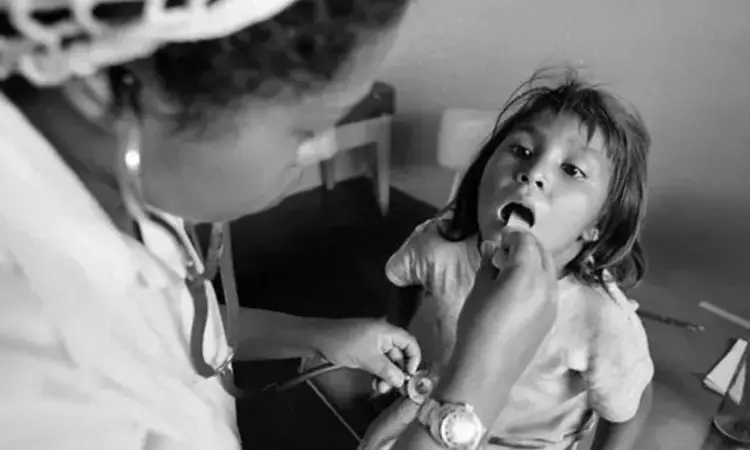- Home
- Medical news & Guidelines
- Anesthesiology
- Cardiology and CTVS
- Critical Care
- Dentistry
- Dermatology
- Diabetes and Endocrinology
- ENT
- Gastroenterology
- Medicine
- Nephrology
- Neurology
- Obstretics-Gynaecology
- Oncology
- Ophthalmology
- Orthopaedics
- Pediatrics-Neonatology
- Psychiatry
- Pulmonology
- Radiology
- Surgery
- Urology
- Laboratory Medicine
- Diet
- Nursing
- Paramedical
- Physiotherapy
- Health news
- Fact Check
- Bone Health Fact Check
- Brain Health Fact Check
- Cancer Related Fact Check
- Child Care Fact Check
- Dental and oral health fact check
- Diabetes and metabolic health fact check
- Diet and Nutrition Fact Check
- Eye and ENT Care Fact Check
- Fitness fact check
- Gut health fact check
- Heart health fact check
- Kidney health fact check
- Medical education fact check
- Men's health fact check
- Respiratory fact check
- Skin and hair care fact check
- Vaccine and Immunization fact check
- Women's health fact check
- AYUSH
- State News
- Andaman and Nicobar Islands
- Andhra Pradesh
- Arunachal Pradesh
- Assam
- Bihar
- Chandigarh
- Chattisgarh
- Dadra and Nagar Haveli
- Daman and Diu
- Delhi
- Goa
- Gujarat
- Haryana
- Himachal Pradesh
- Jammu & Kashmir
- Jharkhand
- Karnataka
- Kerala
- Ladakh
- Lakshadweep
- Madhya Pradesh
- Maharashtra
- Manipur
- Meghalaya
- Mizoram
- Nagaland
- Odisha
- Puducherry
- Punjab
- Rajasthan
- Sikkim
- Tamil Nadu
- Telangana
- Tripura
- Uttar Pradesh
- Uttrakhand
- West Bengal
- Medical Education
- Industry
WHO releases new guideline for clinical management of diphtheria

Switzerland: The World Health Organization (WHO) published the most up-to-date recommendations for clinical management of people with diphtheria on January 14, 2024. The only previously available guidance was an operational protocol.
According to a press release, the new guideline followed the rigorous process for developing guidance at WHO.
The guideline addresses Diphtheria Antitoxin (DAT) use for diphtheria treatment. There is a worldwide shortage of DAT, and many member states requested evidence-based recommendations on DAT use.
The guidance also contains new recommendations on antibiotics. WHO recommends using macrolide antibiotics (erythromycin, azithromycin) rather than penicillin antibiotics, in patients with suspected or confirmed diphtheria.
“This clinical practice guideline has been rapidly developed considering the global rise in diphtheria outbreaks. Outbreaks of diphtheria in Guinea, Nigeria and neighbouring countries in 2023 have highlighted the urgent need for evidence-based clinical practice guidelines for diphtheria treatment. Given the sporadic nature of outbreaks, many clinicians in the affected regions have never managed acute diphtheria and its related complications,” the global health agency stated.
According to the WHO, diphtheria remains a neglected disease and vaccination is the top priority. At the same time, for patients with diphtheria, access to DAT, antibiotics, and supportive care can be lifesaving.
In 2023, outbreaks of diphtheria in Guinea, Nigeria and neighbouring countries and the incidences highlighted the urgent need for evidence-based clinical practice guidelines for diphtheria treatment.
According to WHO, due to the sporadic nature of outbreaks, many clinicians in the affected regions have never managed acute diphtheria and its related complications.
Diphtheria is a severe contagious bacterial infection of the throat and nose. According to the WHO, respiratory diphtheria is caused by strains of Corynebacterium diphtheriae, which have an affinity for the upper respiratory tract (nose and throat) and produce a toxin that causes local disease and, in severe cases, airway compromise and systemic complications.
Diphtheria can be treated with medications but in advanced stages, the bacterial infection can damage the heart, nervous system, and kidneys. Even with treatment, diphtheria can be fatal, especially in children.
Diphtheria spreads from person to person mostly through the air, and less frequently by direct contact. The incubation period is usually from 2 to 5 days.
The current treatment includes the neutralization of unbound toxin with DAT; antibiotics to prevent further bacterial growth; and monitoring and supportive care to prevent and treat complications.
The new recommendations by the WHO are as follows:
- In patients with suspected or confirmed diphtheria, WHO recommends using macrolide antibiotics (azithromycin, erythromycin) in preference to penicillin antibiotics.
- In patients with suspected or confirmed diphtheria, WHO recommends not performing routine sensitivity testing before administration of diphtheria antitoxin (DAT).
- WHO suggests an escalating dosing regimen for diphtheria antitoxin based on disease severity and time since symptom onset, in patients with suspected or confirmed symptomatic diphtheria, compared with a fixed dose for all patients.
Meanwhile, the WHO has strongly recommended using macrolide antibiotics (erythromycin, azithromycin) in preference to penicillin antibiotics. According to WHO:
- Antibiotics should be administered alongside DAT and should not be delayed.
- Recent evidence suggests an increasing resistance to penicillins and less resistance to macrolide antibiotics. Local antimicrobial susceptibility testing is vital to ensure the ongoing appropriate use of antibiotics.
- The choice of macrolide will depend on availability and feasibility.
Dr Kamal Kant Kohli-MBBS, DTCD- a chest specialist with more than 30 years of practice and a flair for writing clinical articles, Dr Kamal Kant Kohli joined Medical Dialogues as a Chief Editor of Medical News. Besides writing articles, as an editor, he proofreads and verifies all the medical content published on Medical Dialogues including those coming from journals, studies,medical conferences,guidelines etc. Email: drkohli@medicaldialogues.in. Contact no. 011-43720751


